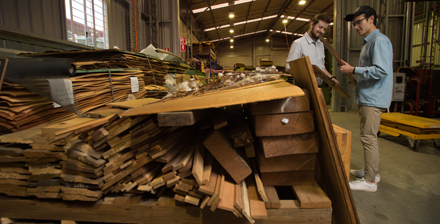
Affordable, simply made school furniture for Papua New Guinea classrooms designed and prototyped by QUT Industrial Design students is headed to PNG for production from wood off-cuts. Source: Timberbiz
QUT Industrial Design senior lecturer Dr Marianella Chamorro-Koc said 11 teams of third-year students worked on the brief from the Department of Agriculture and Fisheries (DAF) and the Australian Centre for International Agricultural Research (ACIAR).
“The students’ prototypes will be sent to PNG to be made into kit-sets that can be manufactured at low cost and sent to rural PNG schools so that families and students can have the experience of putting them together,” Dr Chamorro-Koc said.
“The students’ brief was to produce desks and chairs from discarded wood using old-school tools. We worked with PNG timber company RH Group who sponsored the project and provided the PNG timber for the students’ prototypes.
“The design challenge was to create innovation using timber off-cuts, and to develop viable manufacturing strategies that could be adopted in PNG that are ethically respectful of rural communities’ culture and educational needs of primary schools.
“The students were given timber off-cuts from 12 species shipped from PNG in three sizes to work with. No power tools or glues could be used.
“It was a challenging hands-on exercise for our students who came up with some really great designs.
“It is hoped that donors will help fund the roll-out of the furniture kit-sets so that children no longer have to sit on dirt floors in many classrooms.”
The winning design team, Lainim which means ‘learn’ in pidgin, received $2000 and prizes went to two other teams.
Owen Beard, from the ‘Lainim’ team said they had used ‘lean manufacturing’ techniques.
“Our desk and bench seat used only 60 nails for the whole set. We had to work out a way to keep the thin strips of timber together without glue,” Mr Beard said.
The team will send the plans for the kit-sets for manufacture in PNG and also an instruction sheet for extremely remote areas so that they can use their own locally milled timber to make them.
Dr Chamorro-Koc said the students received support and advice from DAF and ACIAR, and representatives from the PNG education sector, who are PhD researchers at QUT, provided cultural perspectives and values to inform the designs.
DAF team leader Forest Product Innovation Dr Henri Bailleres said the exercise supported one of ACIAR’s objectives to develop engineered wood products appropriate to the timber resources and potential markets.
“For this particular ACIAR project, DAF worked with six private industry partners in PNG and two partners in Australia to design innovative new furniture for elementary schools in PNG using only the timber off-cuts from the diverse range of species in PNG tropical rainforests,” Dr Bailleres said.
“This exciting venture addressed a number of issues in both PNG and Australia.
“PNG has huge timber resources but quite low recovery rates mainly due to the diverse range of species in PNG rainforests which aren’t always matched with the main markets’ demand, while Australia has a large range of under utilised resources and undervalued by-products due to low recovery rates and the cost of production.
“This project provided an option for both scenarios to capitalise on timber by-products.
“DAF congratulates all the students involved in this project for their hard work which resulted in simple yet innovative designs for the furniture.”





